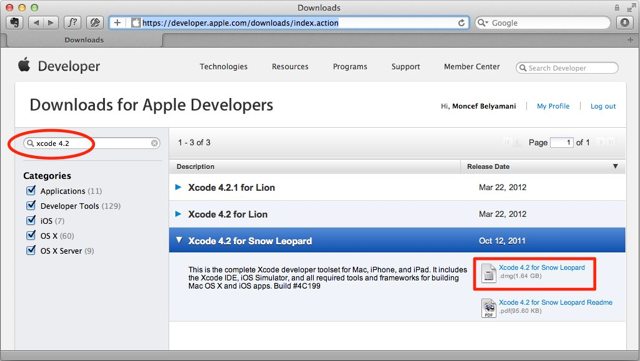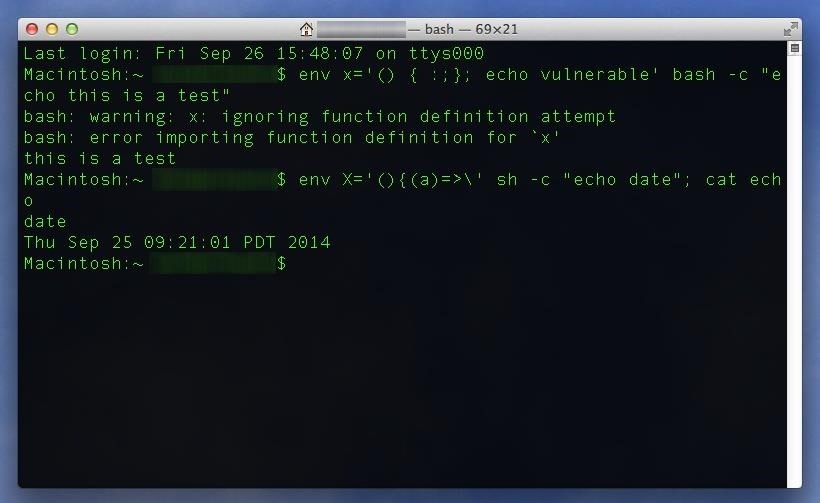This version The latest release version is 3.2.0
'Unknown developer' error when installing (Mac OS X 10.7 and later)
 If you get the message that the FPC installer was created by an unknown developer and cannot be opened, right-click (or ctrl-click) on the installation package and choose 'Open' in the contextual menu. If this does not work, you may first have to go to 'System Preferences' -> 'Security & Privacy' -> 'General', and 'Allow apps downloaded from: Mac App Store and Identified developers'. These workarounds are required because we do not pay Apple 99 euro per year, which would prove you can trust us.
If you get the message that the FPC installer was created by an unknown developer and cannot be opened, right-click (or ctrl-click) on the installation package and choose 'Open' in the contextual menu. If this does not work, you may first have to go to 'System Preferences' -> 'Security & Privacy' -> 'General', and 'Allow apps downloaded from: Mac App Store and Identified developers'. These workarounds are required because we do not pay Apple 99 euro per year, which would prove you can trust us.For over a year now, I've been using XCode 4.5 to build an app using the OS X 10.7 sdk, with target deployment to 10.6. The app runs perfectly well on 10.6, 10.7, 10.8, and 10.9. But when I run it on 10.10, I get a message in the Console saying 'Cannot enforce a hard page-zero' for the app. Although you probably want 4.2.1, not the original 4.2. Besides the fact that you generally want the latest patch release, in this case, many of the new changes in 4.2 were buggy (e.g., 'convert to ARC' would often just hang forever, trying to add iCloud entitlements to an existing project sometimes failed, ) until 4.2.1 – abarnert Jun 14 '12 at 17:59. You can directly download the Xcode from Apple developer website. You have to first sign up as a developer on their website then you will have access to all the.dmg. I'm getting conflicting info on xcode. I'm currently running mac os x 10.6.8 and have the xcode3.2.6andiossdk4.3.dmg installer. Wikipedia says version 4.2 is compatible with mac os x 10.6. Introducing Xcode 12. With an all-new design that looks great on macOS Big Sur, Xcode 12 has customizable font sizes for the navigator, streamlined code completion, and new document tabs. Xcode 12 builds Universal apps by default to support Mac with Apple Silicon, often without changing a.
Xcode 11+ compatibility (macOS 10.15 Catalina and later)
Download Xcode Mac Os X 10.6 8
FPC 3.2.0 is qualified for use with Mac OS X 10.4 till macOS 10.15. Xcode 11+ no longer includes support for compiling Intel 32 bit programs. If you wish to compile such programs, you will have to copy an older Mac OS X SDK from a previous Xcode installation and point the compiler to it with the -XR command line parameter.Xcode 10+ compatibility (macOS 10.14 Mojave and later)
FPC 3.2.0 is qualified for use with Mac OS X 10.4 till macOS 10.15. Xcode 10+ installs some command line file in different locations compared to previous releases. If you already installed FPC under a previous Mac OS X/OS X/macOS version, you will have to reinstall FPC 3.2.0 under macOS 10.14 to get a configuration file that enables the compiler to find the necessary files). See also the section below on how to install the command line tools.Ilife Mac Os X 10.6.8
Xcode 5+ compatibility (OS X 10.9 and later; for OS X 10.8, see below)
FPC 3.2.0 is qualified for use with Mac OS X 10.4 till macOS 10.15. Xcode 5 and later however no longer install the command line tools by default, which are required by FPC. To install them manually, open '/Applications/Utilities/Terminal', execute xcode-select --install and choose 'Install'. Afterwards, FPC will function correctly.Xcode 4.3-5.x compatibility (Mac OS X 10.7/OS X 10.8)
FPC 3.2.0 is qualified for use with Mac OS X 10.4 till macOS 10.15. Xcode 4.3 and later however no longer install the command line tools by default, which are required by FPC. To install them manually, open Xcode, go to Preferences, select 'Downloads;' and install the 'Command Line Tools'. Afterwards, FPC will install and function correctly.Xcode 3.2.x-4.2 compatibility (Mac OS X 10.6)
FPC 3.2.0 is qualified for use with Mac OS X 10.4 till macOS 10.15. There is however an issue when compiling dynamic libraries with FPC under Mac OS X 10.6 due to a bug in the Xcode 3.2.x linker. This bug has been fixed in Xcode 4. You can work around the bug in Xcode 3.2.x by using the -k-no_order_inits command line parameter when compiling a dynamic library.Download the 3.2.0 release in 1 big file:
- fpc-3.2.0.intel-macosx.dmg (162 MB)contains an installation package for compiling Intel (32 bit and 64 bit) programs (updated to install successfully on macOS 10.14 'Mojave').
- fpc-3.2.0.intel-macosx.cross.powerpc-macosx.dmg (125 MB)contains an add-on installation package for compiling PowerPC (32 and 64 bit) programs.
- fpc-3.2.0.intel-macosx.cross.ios.dmg (178 MB)contains an installation package for compiling iPhone/iPod Touch/iPad programs. For Xcode templates, see Phil Hess' site.
- fpc-3.0.5.intel-macosx.cross.ios.dmg (66 MB)contains an installation package for compiling iPhone/iPod Touch/iPad programs. For Xcode templates, see Phil Hess' site.
- fpc-3.2.0.intel-macosx.cross.jvm.dmg (12 MB)contains an add-on installation package for compiling JVM programs.
Back to mirror list
Back to general download page
- 2.1. Install Xcode
- 2.2. Install MacPorts
- 2.3. Upgrade MacPorts
- 2.4. Uninstall MacPorts
- 2.5. MacPorts and the Shell

This chapter shows you how to install MacPorts and its prerequisites step-by-step. Note that the section about installing Xcode is macOS-specific. If you wish to install MacPorts on another platform, first make sure you have a working C compiler installed, skip ahead to installing MacPorts from source, and continue to the end of the chapter.
- 2.1.1. Install Xcode on OS X 10.9 or Later
- 2.1.2. Install Xcode on OS X 10.7 Lion or OS X 10.8 Mountain Lion
- 2.1.3. Install Xcode on Mac OS X 10.6 Snow Leopard
- 2.1.4. Install Xcode on Older Releases of Mac OS X
Xcode is a package provided by Apple containing compilers, libraries and additional tools required to develop applications for macOS.
Note
Always make sure to install the latest available version of Xcode for your macOS release; using outdated versions of Xcode may cause port install failures. Also note that Xcode is not updated via OS X's Software Update utility on OS versions prior to 10.6, and is updated via the Mac App Store starting with 10.7.
Follow the instructions for your version of macOS:
Download the latest version of Xcode from the Apple developer website or get it using the Mac App Store.
Once you have Xcode installed, open a terminal, run xcode-select --install, and click the Install button to install the required command line developer tools. Don't worry if you see a message telling you the software cannot be installed because it is not currently available from the Software Update Server. This usually means you already have the latest version installed. You can also get the command line tools from the Apple developer website.
2.1.2. Install Xcode on OS X 10.7 Lion or OS X 10.8 Mountain Lion
Download the latest version of Xcode from the Apple developer website or get it using the Mac App Store.
Xcode 4.3 and later do not automatically install the command line tools, but MacPorts requires them. To install them, open the Xcode application, go to the Preferences window, to the Downloads section, and click the Install button next to Command Line Tools. Be sure to return to this window after every Xcode upgrade to ensure that the command line tools are also upgraded.
If you wish to create Installer packages with port pkg, you will also need to install PackageMaker, which is in the “Auxiliary Tools for Xcode” package as of Xcode 4.3. The download page for this package can be opened via the Xcode -> Open Developer Tool -> More Developer Tools... menu item. After downloading and mounting the disk image, drag the PackageMaker application to your /Applications directory.
2.1.3. Install Xcode on Mac OS X 10.6 Snow Leopard
If you are using Mac OS X 10.6, there are two branches of Xcode which could be considered to be the latest, 3.2.x and 4.x. Xcode 4 costs money, but Xcode 3 is still available free of charge. There are two options for downloading it:
Xcode 3.2 - smaller download, but you will need to run Software Update after installing to get the latest version. Note that Apple might at some point discontinue providing these updates via their update servers.
Xcode 3.2.6 and iOS SDK 4.3 - includes the iOS SDK which is not needed for MacPorts.
Both are available from the Apple developer website. You may also be able to install Xcode 3.2 from your Mac OS X 10.6 DVD and then run Software Update to get the latest version.
Ensure that those of the following options that are available in the installer for your version of Xcode are selected:
2.1.4. Install Xcode on Older Releases of Mac OS X
If you have an earlier release of Mac OS X, you may download the latest version of Xcode for Mac OS X 10.5 (Xcode 3.0 and Xcode 3.1 Developer Tools) or 10.4 (Xcode 2.4.1 and Xcode 2.5 Developer Tools) from the Apple developer website.
Ensure that those of the following options that are available in the installer for your version of Xcode are selected: